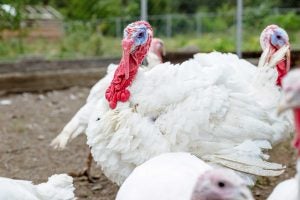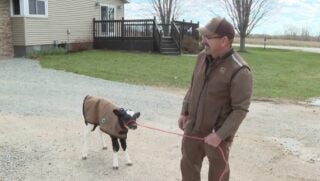The United States Department of Agriculture’s Animal and Plant Health Inspection Service has confirmed the presence of highly pathogenic avian influenza in a commercial turkey flock in Dubois County, Indiana. This is the first confirmed case of HPAI in commercial poultry in the United States since 2020.
Avian influenza does not present an immediate public health concern. No human cases of these avian influenza viruses have been detected in the United States. As a reminder, the proper handling and cooking of poultry and eggs to an internal temperature of 165 degrees Fahrenheit kills bacteria and viruses.
Samples from the affected flock, which experienced increased mortality, were tested at the Indiana Animal Disease Diagnostic Laboratory at Purdue University, part of the National Animal Health Laboratory Network, and confirmed at the APHIS National Veterinary Services Laboratories in Ames, Iowa. Virus isolation is ongoing.
APHIS is working closely with the Indiana Board of Animal Health on a joint incident response. State officials quarantined the affected premises, and birds on the property were depopulated to prevent the spread of the disease. Birds from the flock will not enter the food system.
As part of existing avian influenza response plans, federal and state partners are working jointly on additional surveillance and testing in the nearby area.

Anyone involved with poultry production from the small backyard to the large commercial producer should review their biosecurity activities to assure the health of their birds. APHIS has materials about biosecurity, including videos, checklists, and a toolkit available online.
Avian influenza is caused by an influenza type A virus which can infect poultry (such as chickens, turkeys, pheasants, quail, domestic ducks, geese, and guinea fowl) and is carried by free flying waterfowl such as ducks, geese and shorebirds.
The USDA will report this finding to the World Organisation for Animal Health as well as international trading partners. The USDA also continues to communicate with trading partners to encourage adherence to OIE standards and minimize trade impacts. The World Organisation for Animal Health trade guidelines call on countries to base trade restrictions on sound science and, whenever possible, limit restrictions to those animals and animal products within a defined region that pose a risk of spreading disease of concern.
In addition to practicing good biosecurity, all bird owners should prevent contact between their birds and wild birds and report sick birds or unusual bird deaths to State/Federal officials, either through their state veterinarian or through the USDA’s toll-free number at (866) 536-7593. Additional information on biosecurity for backyard flocks can be found here.


